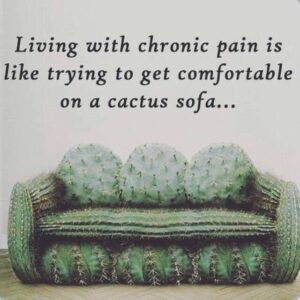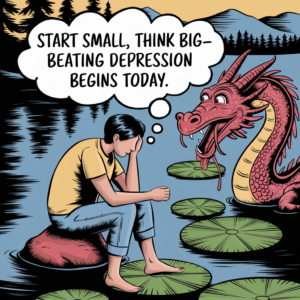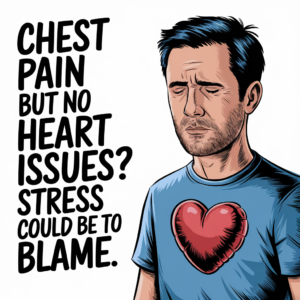Living with chronic pain is an experience that’s difficult to fully comprehend for those who haven’t endured it. It’s akin to trying to find comfort on a couch made of cacti – no matter how you adjust, the pain is always there, varying only in intensity. This constant battle is not just a physical challenge, but a mental and emotional one as well, deeply affecting the lives of those who suffer from it.

The Unrelenting Nature of Chronic Pain
A Constant Companion
- Chronic pain is an ever-present reality, a relentless companion that doesn’t relent, not even for a moment. It’s there when you wake up, throughout your day, and when you try to find rest at night.
- The intensity may fluctuate, but the pain never truly disappears. It’s like a background noise that never fades, impacting every aspect of daily life.
The Cactus Couch Analogy
- The metaphor of trying to get comfortable on a ‘cactus couch’ aptly describes the struggle. No matter how you shift or adjust, there’s no position that offers true relief. It’s a perpetual search for the least painful state.
The Invisible Burden
Misunderstood and Overlooked
- Chronic pain is often an invisible ailment, making it hard for others to understand the extent of the suffering. Because it’s not visibly apparent like a broken bone or a wound, people may underestimate the pain’s impact.
- This lack of understanding can lead to feelings of isolation and frustration for those living with chronic pain.
The Mental and Emotional Toll
- The constant battle with pain takes a significant mental and emotional toll. It can lead to anxiety, depression, and a sense of hopelessness.
- The effort to maintain a semblance of normalcy, to keep pushing through the pain, requires immense mental strength and resilience.
Coping and Perseverance
Finding Ways to Manage
- Those with chronic pain often develop coping mechanisms, whether it’s through medication, therapy, lifestyle adjustments, or a combination of these.
- Finding what works can be a trial-and-error process, adding to the challenge.
The Drive to Keep Going
- Many find the strength to persevere for the sake of loved ones. The desire to be there for family and friends, to participate in life’s moments, provides motivation.
- This drive, however, can also lead to pushing oneself too hard, ignoring the body’s need for rest and recovery.
Q: Why can’t people with chronic pain just take painkillers and feel better?
A: Painkillers can provide temporary relief, but they are not a cure-all solution. Chronic pain is complex and can be resistant to medication. Over-reliance on painkillers can also lead to side effects and, in some cases, dependency. Effective management often requires a multifaceted approach, including physical therapy, lifestyle changes, and sometimes psychological support.
Q: Is chronic pain mostly a psychological problem?
A: Chronic pain is a legitimate physical issue, though it can have psychological components. The pain experienced is very real and not just “in the head.” However, chronic pain can lead to psychological effects like depression and anxiety, creating a cycle that can exacerbate the physical experience of pain.
Q: Can’t people with chronic pain just push through it?
A: While many people with chronic pain do their best to maintain normalcy, “pushing through” is not always feasible and can sometimes worsen their condition. It’s important to strike a balance between activity and rest, and to recognize and respect the body’s limits.
Q: Does chronic pain ever go away?
A: For some, chronic pain can be managed effectively to the point where it becomes a minor inconvenience. However, for many others, it remains a lifelong condition. The focus is often on management and reduction of pain rather than complete elimination.
Q: How can I support someone living with chronic pain?
A: Understanding and empathy are crucial. Acknowledge their pain and listen to their experiences without judgment. Offer help with daily tasks when needed, and encourage them when they find strategies that help manage their pain. Most importantly, be patient and recognize that their abilities may vary from day to day.
Q: Can lifestyle changes really help with chronic pain?
A: Yes, lifestyle changes can play a significant role in managing chronic pain. Regular exercise, a healthy diet, good sleep hygiene, and stress reduction techniques can all contribute to pain reduction and overall well-being.
Q: Is it common for people with chronic pain to experience depression?
A: Yes, there is a significant correlation between chronic pain and depression. The constant struggle with pain can lead to feelings of despair and hopelessness. It’s important for chronic pain sufferers to seek support for both their physical and mental health.
Living with chronic pain is a complex and deeply personal experience. Understanding, compassion, and a comprehensive approach to management are key to supporting those who navigate this challenging path.
Living with chronic pain is a relentless challenge that is hard to articulate to those who haven’t experienced it. It’s a journey marked by constant discomfort, misunderstood struggles, and an ongoing search for relief. Yet, amidst these trials, there’s a remarkable strength and resilience displayed by those who face this battle every day. They continue to press on, finding ways to manage their pain and drawing motivation from their loved ones, embodying a spirit of endurance that is truly admirable.
As an Amazon Associate we earn from qualifying purchases through some links in our articles.




